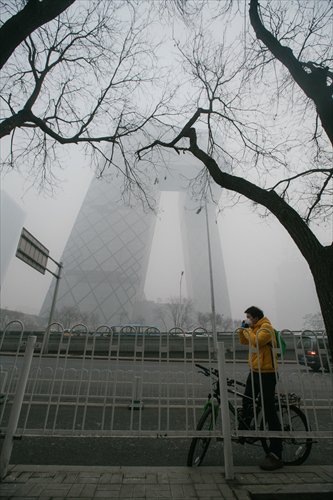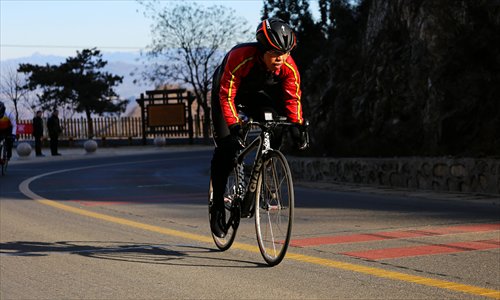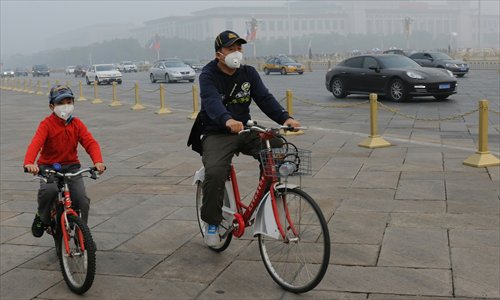Beijingers ride through smog to promote green transportation

Beijing-based cyclists recommend that people wear anti-pollution masks when riding a bicycle on smoggy days. Photo: Li Hao/GT
While smog and haze continue to shroud Beijing, residents are advised to stay indoors as outdoor activities are deemed unsafe and unhealthy. But those who live in urban areas still have to get around, and in today's fast-paced society, the swiftest means of transport, a car or the subway, is king.
However, for some Beijing-based cyclists, riding is the best and only choice. A persistent group, they insist on cycling to and fro regardless of whether the sky is blue or a smoggy gray. They hope that their dedication to cycling can change the negative mindset that riding in smog is unsafe.
No cars please
On her colorful fixed gear bike, German Ines Brunn is among the coolest cyclists in Beijing. For Brunn, the founder and owner of Natooke bike store in Wudaoying Hutong in Beijing, biking has been her unchanged choice of transport.
"Even if the air is polluted, I still need to get around," she said. "[In terms of inhaling the air,] there is not much difference if you walk or stand on the street waiting for a taxi, or you walk to the subway or you ride a bike."
And if you take a taxi, you are contributing to the pollution, said Brunn.
A more responsible behavior, from her perspective, would be "try to reduce pollution rather than contribute to it."
Beijing native Zhang Yanbo agrees. "When I was a child, there were not many cars, and I could even fly a kite in Tiananmen Square on Chang'an Avenue. Today, there are traffic jams everywhere, and it is time people start changing their lifestyle."
Zhang, a bike enthusiast, has never considered buying a car. Over the years, he has kept up the habit of traveling by bike, which takes him about two hours daily.
"Polluted air is not an obstacle for me. I only stop riding if it rains," said Zhang.

Zhang Youjun persists in riding his bicycle to work regardless of whether it is clear or smoggy outside. Photo: Courtesy of Zhang Youjun
Wearing a mask
In Zhang's opinion, riding a bike in smog does not affect one's health. He said he became aware that air pollution poses health risks for cyclists in Beijing in 2014.
An opinion leader in Beijing's bike community, Zhang initiated a group buying effort to help bikers purchase a type of anti-pollution mask of the standard of gas masks used in manufacturing plants.
Zhang Youjun, who works in a real estate company in Beijing, rides one or two hours to work every day. Before he started using the anti-pollution mask, he wore an ordinary mask and intentionally kept his heart rate under 100, which means he rode at a slow speed.
He later realized the necessity of an anti-pollution mask for riding activities in Beijing.
"For example, on a polluted day when you finish riding, take off the anti-pollution mask and enter a room, even one with an air purifying machine, you immediately smell the pollution in the room," said Zhang Youjun.
Brunn wears a mask that was designed by a triathlete in the UK who had the same issue in London two decades ago when he wanted to train for a triathlon, a long-distance race consisting swimming, bicycling, and running, but needed to cope with the air pollution caused by car exhaust fumes.
Cycling in winter
Air pollution levels can be especially high during the winter months when much of China depends on coal burning to remain warm. For those who do not want to go out on the street, cycling at home is also a worthwhile alternative, according to Zhang Yanbo.
"Cycling is an aerobic exercise that can be conducted at home," he said. "Many people go to gym in winter. But some of the gyms are not equipped with air purifiers and the sealed space in fact makes the air quality even poorer," he said.
He suggests that people buy a bike stand to work out on at home. "You turn on the air purifier, and then cycle for 40 minutes. You can achieve the goal of doing sports on smoggy days," he said.
Brunn regularly organizes riding activities in Beijing's suburbs. Cycling is labor intensive, so if the AQI is above 150 , she would call off the event. Now she tries to work out the precise smog forecast for the next 10 days.
Brunn checks three weather indexes every day. "I use an app to check the current level of air pollution. The smog forecast tells the next time when the air is good but I don't know what's in between," she said. "Then I check the wind forecast because if there is wind from the northwest, it will blow the pollution away; if there is wind from the south, it will bring the pollution to us."

Beijing's avid cyclists say that when people take a taxi on smoggy days, they are still contributing to air pollution. Photo: CFP
Public awareness
Since smog and haze frequently hit media headlines, Chinese people's awareness of environmental protection and sustainable development has increased substantially over the years.
In December 2015, the Beijing government issued its first red alerts on smog, the highest in a four-tier warning system, which prompted the implementation of traffic restrictions to lessen the number of cars on roads.
The government also launched campaigns to promote electric vehicles and build more bike lanes in the city.
"When the public understands the make up of smog and haze, I am sure that individuals will try to make lifestyle changes," said Zhang Youjun. "The smog and haze may accelerate Beijinger's speed toward a green lifestyle because no one would do harmful things to the environment as long as they are aware that they are wrong."
Brunn said that over the past three years she has seen a big change in Chinese people's environmental awareness.
"A lot of my friends, Chinese people, are talking about the environment. It is definite now that people realize that they can't just spend money consuming and not care about the environment because, in the end, we are living here."
She gave an example of how Germans have re-embraced bicycles. In the 1980s, more people started riding bicycles after realizing that "if we ruin the air we breathe, we ruin the water we drink and the food we eat, and we will get sick."
Due to the overload of cars, cities were becoming unlivable, and parents who found no space for their children to play in town relocated to the suburbs. It caused a lot of problems in the city, she said.
Then the German government decided to restructure the city's layout and created more space for pedestrians and cyclists by establishing bike-only areas and making people who wanted to live in the area park far away.
"In the old days people said no, I need my car. I need to park my car near my home. But now, many Germans have changed their minds," said Brunn. "They kind of think that the quality of life is about being able to breathe, being free, being able to have space and safety, and they accept it."
Newspaper headline: Fighting the haze